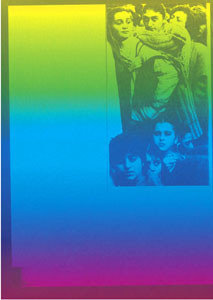Andro Wekua
dal 31/5/2007 al 27/7/2007
Segnalato da
31/5/2007
Andro Wekua
Galerie Peter Kilchmann, Zurich
The artist's paintings, drawings, films and space-consuming installations of ceramic and wax sculp-tures all share his intensely sensitive way of working with figurative elements and basic geometric pat-terns.

Interlude
Andro Wekuas´ paintings, drawings, films and space-consuming installations of ceramic and wax sculp-tures all share his intensely sensitive way of working with figurative elements and basic geometric pat-terns. The images he creates rest in that dimension between reality and memories. They provoke existen-tial self-assessment and speculations in us. Wekuas´ protagonists gesture silently and move within picto-rial spaces, which are mainly a composition of images from his archive, which consists of illustrations he found in books and magazines. It is hard to make out a preference for certain types although it appears as if his characters are rather quiet and introverted. Proof of this observation is the recurrent motif of closed eyes and the figure in the painting, which lets their eyes wander into the distance. The composition of his paintings is determined by the line as well as the colour, which acts as a structuring element, while the visual raw material seems to define the process of the image creation.
Wekua cannot re-invent the humans and their existential orientation; he however tries to generate dreamlike situations of standstill. His works encourage us to deal with questions about subjective mo-ments and the scope of memories or in Karl Jaspers´ words: “As existence means to be in a situation, I can never get out of that situation without entering a new one.” Therefore a situation could be seen as an interlude within reality. This results in a directness, which is present in Andro Wekuas´ paintings and in-stallations, and it intensifies in the mode of performance. In his installations, Wekua adapts artistic meth-ods from theatre and cinematography. That way he often creates stage-like installations with charged atmospheres such as Wait to Wait (2006). This installation can currently be seen in the permanent collec-tion of the Museum Boijmans van Beuningen. It shows a grown-up boy sitting on a rocking chair inside a greenhouse-like architecture with coloured glass screens. The scenario is being dominated by a minimal movement, which breaks the silence. The rocking chair moves slightly back and forth, while the foot of the figure unremittingly touches the glass screen at the front. This movement, which is being performed in an infinite loop, symbolizes the act of waiting as a way of life.
A sculpture cast in aluminium takes the centre stage at the exhibition Interlude and it points to the fragmentary moment of his works. This massive sculpture is a composition of different objects: wooden pallets, a cable drum, a round table and a human figure. This figure sits elevated and emerges from a geometric shape, as the major part of it had been plastered in a rough and at the same time diligent way. Only the figure’s head and legs are visible. The abstract shape consumes the figure. In this sculpture as well as in his paintings the artist takes up the motif of the mask: he either abstracts his works with the help of a colour field by over-painting the face or with a concrete object. Prosopon in Greek means the natural visage of the human being. It also means mask and later on stands for the character performed in theatre.
With the stove pipe hat on the figure’s head Wekua quotes the character of the gambler or the magician. The pair of hands behind the figure, which seem to rest on the edge of the table however are a little mis-leading. On the right hand side next to the figure, another pair of hands is acting and gesticulating upon sticks. These sticks remind us of the lines which form part of his paintings and which Wekua includes as a continuation of a form (such as the nose or the tongue). As if it was a spare part, a fifth hand lies next to more sticks at the lower level of the cable drum. The shaping process is the actual topic of the sculpture because for the artist the finite state at the same time represents the ideal state, which is being transferred into eternity in the form of a massive manifestation made from aluminium. The state of adding something to the work is being brought to a termination. Frozen. The interlude concludes.
Opening: Friday, 1st of June 2007, 6 p.m. - 8 p.m.
Galerie Peter Kilchmann
Limmatstrasse 270 - Zurich



